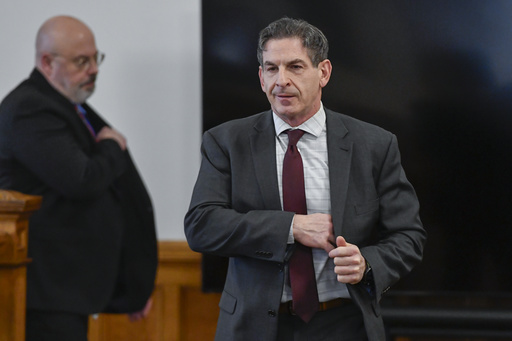
MAYVILLE, N.Y. — In the trial concerning the 2022 stabbing of writer Salman Rushdie, Hadi Matar, the 27-year-old defendant from New Jersey, chose not to testify in his own defense on Thursday, as his legal team concluded their case without introducing any witnesses.
When asked by Judge David Foley of Chautauqua County if he wanted to take the stand, Matar simply replied, “No, I do not.”
Earlier that day, prosecutors concluded their presentation with a forensics expert as their final witness, finishing a week-long series of testimonies, which included Rushdie’s own description of the events.
Closing arguments from both sides are set to take place on Friday, followed by the jury’s deliberation process. Matar is facing charges of attempted murder and assault in Chautauqua County Court, in relation to an attack that occurred at the nearby Chautauqua Institution. The assault left Rushdie, 77, with severe injuries, including blindness in one eye, while another victim, Henry Reese, who was with Rushdie, sustained a cut above his eye.
Throughout the proceedings, Matar was observed taking notes and conferring with his lawyers. There were instances when he would express statements such as “Free Palestine” as he entered or exited the courtroom, but his legal representatives did not disclose whether he intended to testify.
Despite Matar’s defense team choosing not to present witnesses, they worked to undermine the credibility of prosecution witnesses in an effort to demonstrate the defendant might not have had the intention to kill Rushdie, rather just to injure him. This differentiation significantly affects the potential verdict of an attempted murder charge.
The defense contended that Matar armed himself with a knife rather than a firearm, with the assertion that the attack witnessed by individuals could be characterized as merely a “skirmish” or “scuffle.” The public defender for Matar, Nathaniel Barone, commented outside the courtroom that they believe the prosecution has not successfully established an intent to commit murder.
Barone also noted that, due to Rushdie’s elevated status, Matar could be facing a more serious charge than he might if his victim were a private individual.
Rushdie endured more than a dozen stab wounds and cuts to various parts of his body during the unprovoked assault, which took place as he was preparing for a forum focused on the safety of writers. Post-attack, he was hospitalized for 17 days and spent over three weeks rehabilitating in a facility in New York City.
In addition to the state trial, Matar is also facing charges at the federal level in Buffalo, where he is indicted for allegedly attempting to offer material support to the militant organization Hezbollah.

